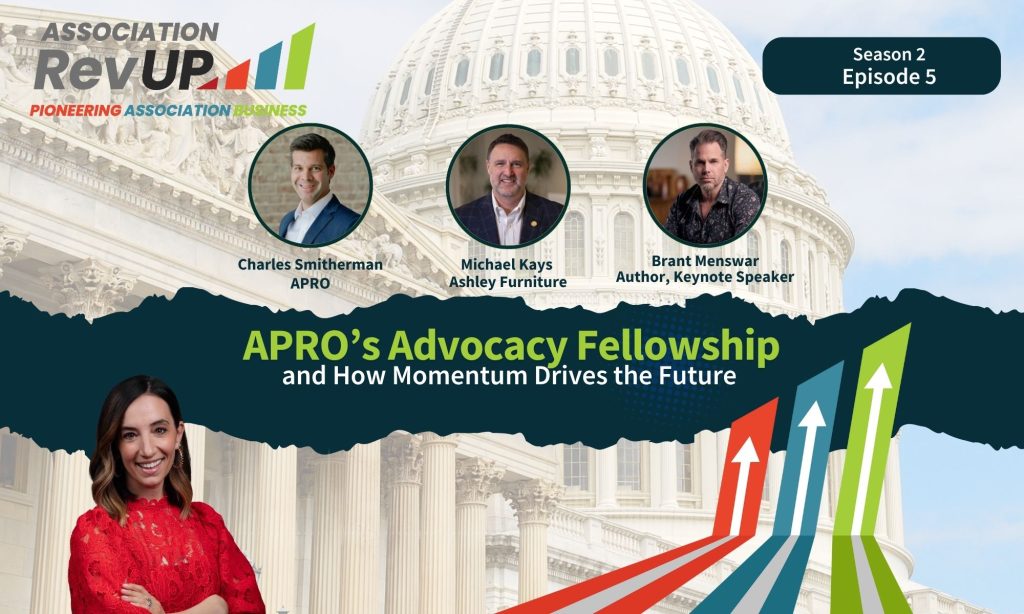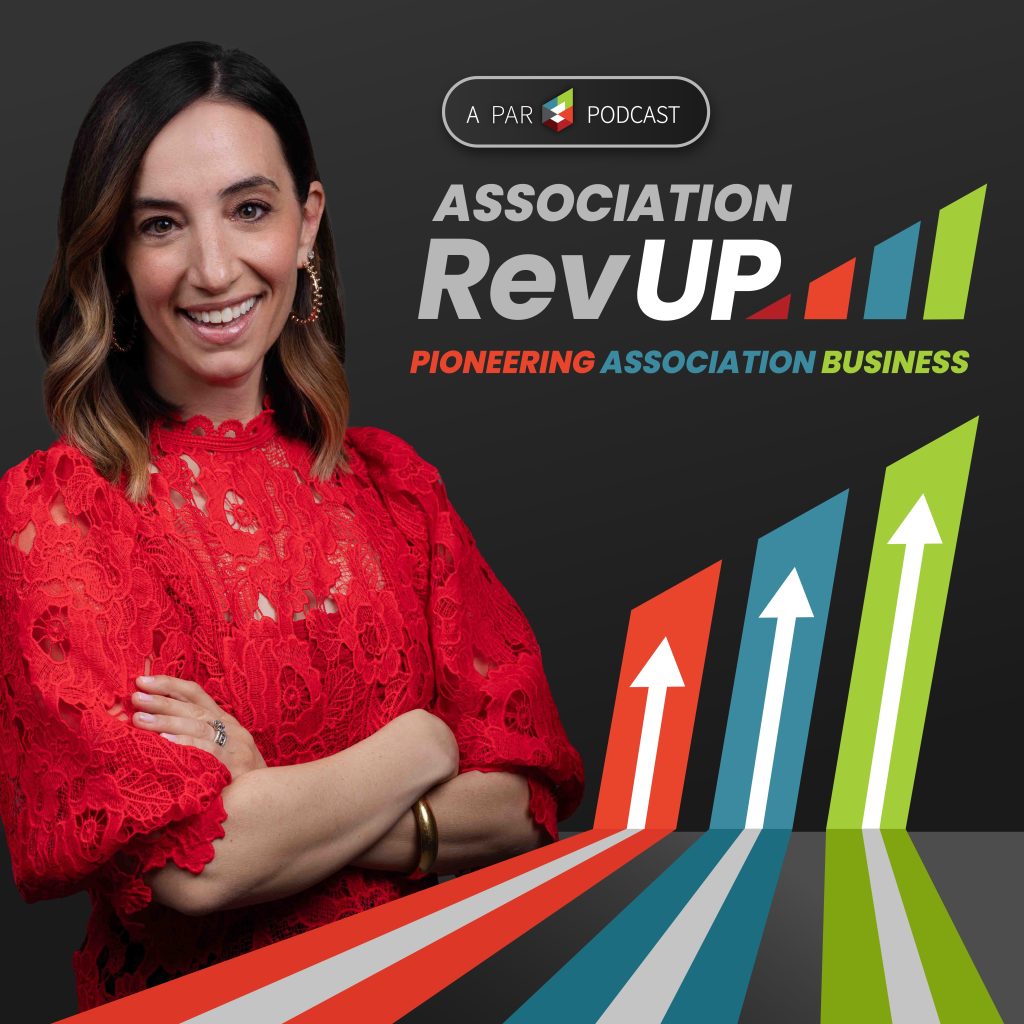APRO’s Advocacy Fellowship and How Momentum Drives the Future (S2:E5)

VOICES IN THIS EPISODE
- Brant Menswar
Black Sheep Foundry LLC, Founder - Charles Smitherman
APRO, CEO
FROM THIS EPISODE
LISTEN NOW
RELATED ARTICLES & RESOURCES
FULL TRANSCRIPT
APRO’s Advocacy Fellowship and How Momentum Drives the Future (S2:E5)
Charles Smitherman: I mean the advocacy in a lot of ways. It’s like insurance, or it’s like a legal support center. It’s a cost center. It’s hard to be able to see. Okay, we’re going to invest this, and we’re going to have this return on it because you don’t see what happens when you don’t invest it.
Welcome to the Association RevUP podcast, presented by Professionals for Association Revenue—where we explore how associations are using better business to work towards their mission and impact their industries.
If you work in or with associations, this episode is one you’ll want to hear because we’re talking about a topic that associations can’t afford to ignore: the future of not only your association, but your entire industry.
And we’re doing it with a story from A-PRO, the Association of Progressive Rental Organizations. Find out how they are securing partner funding to not only advocate for their future, but also create real buy-in from the next generation of members.
Then, we’ll zoom out to hear why this approach works, with insights from keynote speaker and author Brant Menswar, who explains how associations can build unstoppable momentum by meeting four core human needs.
I’m Carolyn Shomali, Director of Content for PAR. And I’m really excited for you to hear this episode – let’s get started!
**
As associations grapple with sustainability its easy to overlook awareness – but ensuring people know what you do and why you do it is vital according to APRO CEO Charles Smitherman.
Smitherman: It’s a matter of. We need to be telling our story who we are, what we do, and to address any of those misconceptions that may be out there
For nearly 30 years, members of the Rent-to-Own industry have traveled to Washington, D.C. for A-PRO’s Annual Legislative Conference. Their goal? To educate lawmakers about how rent-to-own provides consumers with access to furniture, electronics, and appliances—without debt, credit impact, or obligation to buy.
But a few years ago, A-PRO realized they had a potential gap in their advocacy work.
Smitherman: We have a lot of people that were here back in the eighties and nineties, and they’ve got a lot of experience. They’ve got a lot of these relationships with our Congressional representatives. There’s a lot of knowledge that these members have.And we have a lot that have their own way of advocating have their own ways of telling stories. And so the idea was really, how do we continue to sustain this for another 30 years? And Mike had an idea.
Mike Kays is the Vice President of Rental Sales at the retailer, Ashley Furniture. While most of A-PRO’s 335 member organizations are rent-to-own dealers, about a third are vendors like Ashley, who supply the dealers with products and who are equally invested in the industry’s future. But for the industry to survive and thrive, it needs the next generation of rent to own professionals to join in the advocacy.
Kays: There’s a lot of younger people that have gotten into rent to own. But they have no idea the protections that really need to be around it, or it could. It could go away. And if it goes away, it’s not just their job that goes away. It’s again an avenue for that end. Consumer will no longer have that avenue to get that nice stuff. Go up there with a guy, somebody to show them the ropes. Get them introduced to DC. And it’ll do a couple of things. Number one. It’ll get them more engaged in their job. It’ll help tell the story to rent to own, and it’ll build a stronger base like Charles was talking about for the future of rent to own, because we all need to be looking for our future.
That idea led to the **Legislative Fellowship Program**. It launched in 2024 with 10 fellows, expanded to 15 in 2025, and is on track for 20 in 2026. It covers conference registration and hotel costs and Ashley Furniture was its first financial supporter before support grew. It give young professionals direct exposure to advocacy—and the bigger picture of why it matters for their industry.
Kays: This fellowship program is is meant to give them the the hands on experience that that’s out there, and the freedoms that we have right now to trade in a rent to own space. They’re not guaranteed. There’s nothing guaranteed about it. We need to support and fight and educate, and everything else we need to do, because nothing’s guaranteed tomorrow, and I think you know the the feedback that I’ve gotten from the fellows has been tremendous. They’ve been very appreciative of the opportunity. It’s opened their eyes for things that never thought about before, and they come back a much richer person and a better employee, when they come back to their home state and their hometown.
Even if your association doesn’t engage in federal advocacy, there’s a lot to learn from this APRO intiative. Two major takeaways stood out to me in my conversation with Charles and Mike.
The first: big ideas come from strong relationships. Did you catch that Mike and Ashley Furniture helped shape the original idea? That kind of collaboration didn’t come from a cold ask; it came from a long-standing relationship between A-PRO and Ashley. Meaningful programs like this rarely start with a one-off request—they grow from ongoing conversations with industry partners who are invested in your mission. If your association isn’t regularly engaging both members and suppliers in shaping the future, your missing a vital part of the conversation.
The second takeaway: not everything has a clear-cut financial ROI—but rather long-term industry implications. At PAR, we regularly hear from members about the challenges they face in showing the ROI for a project when it doesn’t yet exist. What the APRO story reminds us is that not every project has immediate financial returns – associations may not always be able to promise short-term gains, but they can help partners envision the long-term value. And when one partner jumps on board, others will usually follow once they see the outcome, even without a line-by-line return.
Smitherman: Not only did Mike come back and say, We’ll do. We’ll do some fellowships this year. We had more State associations that came in, and then we had more vendors that said, Okay, well, if Ashley’s doing it, we’re into, we’ll do a couple. We’ll do 1, 2, 3, and so we had more vendors participating this year.
This A-PRO program is fueling momentum for both advocacy and membership—but what’s driving the buy-in on a human level? Renowned author, keynote speaker, and 2024 RevUP Summit mainstage speaker Brant Menswar says there are four key elements associations should focus on to build unstoppable momentum. He’ll share those in just a moment, but first: a quick reminder that the insights you’re about to hear came from PAR’s very own event…the RevUP Summit. Our amazing onsite event production team, VPC Incorporated, recorded the audio of every session so we could share it with a broader audience in this podcast format. They partner with us to bring you this podcast, and simply put, there isn’t a better production company out there to bring your association event to life. Check the show notes for a link to their information.
Menswar: All right, how do we create momentum? We’re going to approach it with the mindset of, what if there was a way? But what are the four elements of momentum? Why is this important? Because this momentum is the same. Whether you are communicating internally to your people or you’re communing externally to your members. You want to create momentum for your members. You want to create momentum for your people. This is all the same. It works. The science is the science. So let’s talk about exactly what this looks like.
That’s Brant Menswar—best-selling author, keynote speaker, and one of the most compelling voices on organizational culture and leadership. His framework for building momentum aligns perfectly with what A-PRO has accomplished through its advocacy fellowship program.
Whether intentionally or not, A-PRO has created momentum for both their industry and their membership by tapping into four core human needs: Belonging, Understanding, Meaning, and Purpose. Together, these elements form the acronym Brant uses: BUMP.
Menswar: The idea with bump is that when you think about bumping into something, you literally cause it to move forward, right? That’s what you’re trying to do.
Let’s take a closer look at two of those momentum drivers—meaning and purpose—as they show up in the APRO story.
Starting with meaning. In theory, every association is rooted in meaningful work. But the real opportunity lies in making sure members feel connected to that meaning. A-PRO did exactly that by inviting younger professionals into the real-world, high-stakes work of advocacy. By doing so, they didn’t just tell them the mission mattered—they let them experience it alongside peers and mentors.
Menswar: What’s the meaning behind it? And this is really about shared values. When we start working with other people, when we start working with other organizations, the more that we can connect shared values, the stronger a connection we’re going to have the number one shared value among all people is connection. Not only is it the number one shared value, it’s the number one shared value by a 50% margin to the next closest shared value. Does everybody get that the number one shared value by a 50% margin to the next closest value. So that’s how important it is. So if your goals that you have are not rooted in connection, you are setting yourselves up for a 50% chance of failure period. So it has to be based in connection.
That’s a powerful reminder. If we want members to act, invest, or stay—we have to start with connection. APRO built that connection into the very design of the fellowship.
Now let’s talk about purpose—the second momentum driver. APRO was founded in 1980 to create a regulatory framework for the Rent-to-Own industry, which eventually led to protections in 47 states. Staying true to that purpose today means making sure every member—not just the seasoned advocates—has a voice in where the industry goes next.
Menwar: Here is a huge difference between cooperation and collaboration, and when you are aligning values with action, you need to know the difference between these two things. Cooperation. Cooperation is basically working towards a single person achieving what they want. If you’re working together without alignment, you are cooperating. If you are working together without alignment, you are cooperating. If you are working towards a shared goal, you are collaborating.
The fellowship program didn’t happen through cooperation—it took collaboration. A shared purpose. Shared values. Shared vision. And today, the Legislative Conference itself relies on that same kind of collaborative spirit to be successful year after year.
So what can we take away from A-PRO’s story?
First, momentum doesn’t just happen—it’s built. And it’s built when associations tap into core human needs like meaning and purpose, not just metrics and membership counts.
Second, sustainable programs grow out of strong relationships. Not every idea needs to start with a proposal. It might start with a conversation—with a vendor, a member, or a partner who shares your mission.
And finally, don’t let the lack of immediate ROI stop you from acting. Sometimes the clearest measure of value isn’t on a spreadsheet—it’s in the people who show up, speak out, and carry your mission forward.
This is how associations build not just programs—but movements.
I’m Carolyn Shomali, and this has been another episode of the Association RevUP podcast. Thanks for listening.



